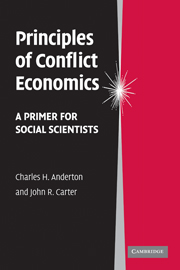Book contents
- Frontmatter
- Contents
- List of Figures
- List of Tables
- Preface
- 1 Introduction: Definition and Scope of Conflict Economics
- 2 Production Possibilities and the Guns versus Butter Trade-Off
- 3 Rational Choice and Equilibrium
- 4 Fundamentals of Game Theory
- 5 A Bargaining Model of Conflict
- 6 Conflict between States
- 7 Civil War and Genocide
- 8 Terrorism
- 9 Geography and Technology of Conflict
- 10 Arms Rivalry, Proliferation, and Arms Control
- 11 Military Alliances
- 12 Conflict Success Functions and the Theory of Appropriation Possibilities
- Appendix A Statistical Methods
- Appendix B A More Formal Bargaining Model of Conflict
- References
- Author Index
- Subject Index
8 - Terrorism
Published online by Cambridge University Press: 05 June 2012
- Frontmatter
- Contents
- List of Figures
- List of Tables
- Preface
- 1 Introduction: Definition and Scope of Conflict Economics
- 2 Production Possibilities and the Guns versus Butter Trade-Off
- 3 Rational Choice and Equilibrium
- 4 Fundamentals of Game Theory
- 5 A Bargaining Model of Conflict
- 6 Conflict between States
- 7 Civil War and Genocide
- 8 Terrorism
- 9 Geography and Technology of Conflict
- 10 Arms Rivalry, Proliferation, and Arms Control
- 11 Military Alliances
- 12 Conflict Success Functions and the Theory of Appropriation Possibilities
- Appendix A Statistical Methods
- Appendix B A More Formal Bargaining Model of Conflict
- References
- Author Index
- Subject Index
Summary
As described in Chapter 1, international terrorism is a significant form of extra-state conflict, while domestic terrorism is a frequent mode of intrastate conflict. In this chapter we present data on worldwide patterns in international and domestic terrorism incidents, casualties, targets, and tactics. We then apply principles of economic choice and game theory to terrorists' resource allocation decisions and governments' counterterrorism efforts. Selected empirical studies of the risks and economic effects of terrorism are also summarized.
Defining Terrorism
There is disagreement among scholars regarding the distinction between terrorism and other forms of violence, such as armed robbery or nation-state warfare (Hoffman 1998, ch. 1). For the purposes of this chapter, we adopt Enders and Sandler's (2006a, p. 3) definition of terrorism as “the premeditated use or threat to use violence by individuals or subnational groups in order to obtain a political or social objective through the intimidation of a large audience beyond that of the immediate victims.” By this definition, terrorism is fundamentally political or social in the sense that terrorists desire to “change the system,” something that is not a priority for criminals (Hoffman 1998, p. 42). The political or social goals of terrorists coupled with their desire to intimidate a large audience lead terrorists to operate outside the usual rules of warfare. Hence, terrorist incidents often involve hostage taking of diplomats, execution of kidnapped military officers, and attacks against civilians (Hoffman 1998, pp. 34–35).
- Type
- Chapter
- Information
- Principles of Conflict EconomicsA Primer for Social Scientists, pp. 126 - 154Publisher: Cambridge University PressPrint publication year: 2009



